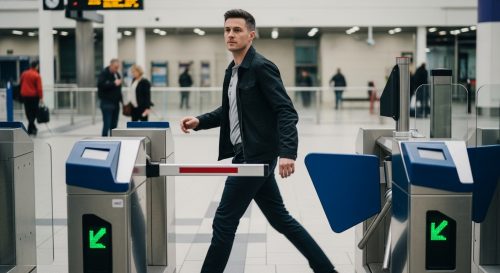What Does Fare Evasion Mean?

What Does Fare Evasion Mean?
Fare evasion is the act of travelling on public transport without paying the required fare. Often called “fare dodging,” it encompasses a wide range of behaviours from accidentally forgetting to tap in with a contactless card to deliberately jumping over ticket barriers. What many passengers don’t realise is that in the UK, fare evasion is a criminal offence, not merely a minor infraction.
Key Point: What does fare evasion mean? Fare evasion is a criminal offence in the UK that can result in prosecution, fines up to £1,000, and a criminal record that appears on background checks for up to 11 years.
The Legal Definition and Framework

In the UK, fare evasion falls under several pieces of legislation. The primary laws governing fare evasion include the Regulation of Railways Act 1889, Railway Byelaws 2005, and for buses and trams, the Public Passenger Vehicles Act 1981.
What makes fare evasion particularly serious is that many offences are classified as “strict liability” offences. This means you can be convicted simply for not having a valid ticket, regardless of whether you intended to avoid paying. Your intentions or whether you made an honest mistake are often legally irrelevant—the offence is complete the moment you travel without proper payment.
Common Methods of Fare Evasion
Fare evasion takes many forms, ranging from honest mistakes to calculated fraud. Understanding these methods helps explain why transport operators take enforcement so seriously:
Turnstile jumping or gate pushing: Physically jumping over or pushing through ticket barriers remains one of the most visible forms of fare evasion, particularly on underground systems.
Tailgating: Walking closely behind a passenger with a valid ticket to slip through barriers before they close.
Incomplete journeys: Deliberately tapping in at one station but not tapping out at the destination, or vice versa, resulting in incorrect fare calculation.
Using invalid tickets: This includes using expired tickets, children’s tickets when you’re an adult, or concessionary passes you’re not entitled to use.
Ticket sharing: Lending season tickets or Freedom Passes to others, even partners or spouses, is illegal in most cases and constitutes fare evasion.
Short-ticketing or “doughnutting”: Purchasing tickets for shorter journeys than actually travelled to pay lower fares, a practice called “doughnutting” because the ticket coverage looks like a doughnut on the Tube map.
Boarding through rear doors: On buses or trams, entering through exits to avoid the driver or payment points.
Ticket forgery or alteration: Changing dates on season tickets or creating counterfeit passes—this is particularly serious and may be prosecuted under the Fraud Act 2006 rather than standard fare evasion laws.
Avoiding ticket inspectors: Deliberately moving between carriages or hiding in toilets when inspectors approach.
The Spectrum of Intent

Not all fare evasion is created equal. Research from Melbourne, Australia, identified four distinct types of fare evaders based on their attitudes and intentions, and similar patterns are evident in the UK:
The Accidental Evader: These passengers hold strong views against fare evasion but occasionally find themselves travelling without a valid ticket due to genuine mistakes—perhaps they rushed through a station and forgot to tap in, or there was a technical issue with payment systems.
The “It’s Not My Fault” Evader: These passengers meant to pay but encountered barriers to payment, such as broken ticket machines, closed ticket offices outside operating hours, or confusing fare zones.
The Calculated Risk-Taker: These passengers deliberately fare evade when they believe the potential savings outweigh the risk of being caught and fined. They may travel without tickets occasionally when they perceive enforcement to be light.
The Career Evader: Persistent offenders who consistently travel without paying. In 2023, TfL investigated 421 people for habitual fare evasion who made more than 50,000 fraudulent journeys across the London Underground, defrauding TfL of over £300,000.
While the law may not always distinguish between these categories—particularly for strict liability offences—transport operators and courts do consider intent when deciding whether to issue penalty fares or pursue prosecution.
Why Fare Evasion Is a Serious Issue
Transport for London estimates that fare evasion costs around £150 million per year. This isn’t just an abstract figure—it’s money that would otherwise fund service improvements, station upgrades, new trains, and better accessibility features. Every pound lost to fare evasion is a pound that must be recovered through higher fares for honest passengers or reduced investment in the network.
Beyond the financial impact, fare evasion has other consequences. Revenue disputes are a precursor to approximately half of all reported violence and aggression incidents towards frontline staff. When inspectors challenge fare evaders, situations can escalate quickly, putting transport workers at risk.
There’s also an equity issue. Fare evasion unfairly disadvantages the overwhelming majority of passengers who pay correctly. It creates a sense that some people are “getting away with it” while others bear the full cost of travel, undermining the social contract that makes public transport possible.
The Consequences: From Penalty Fares to Criminal Records

When caught fare evading, passengers face several possible outcomes depending on the circumstances and the transport operator’s assessment:
Penalty Fares: These are civil sanctions, not criminal penalties. Currently, TfL’s penalty fare is £100, reduced to £50 if paid within 21 days. Penalty fares are often issued for first-time offences or cases where there’s no clear evidence of deliberate evasion.
Prosecution under Railway Byelaws: For more serious or repeated cases, transport operators can prosecute under Railway Byelaw 18(1) for entering a train without a valid ticket. This is a criminal offence with a maximum fine at Level 2 on the standard scale.
Prosecution under the Regulation of Railways Act 1889: Section 5(3) makes it an offence to intentionally travel without paying the fare. This charge is more serious as it includes the element of intent, carries a Level 3 fine (currently up to £1,000) and up to three months imprisonment. Because it’s a recordable offence, convictions appear on standard or enhanced DBS checks for 11 years.
Prosecution under the Fraud Act 2006: For the most serious cases—persistent evasion over extended periods, or ticket forgery—transport operators may pursue fraud charges which carry significantly harsher penalties, including substantial fines and potential imprisonment.
In 2023, TfL prosecuted 19,614 people for fare evasion, an increase of 56 per cent on 2022, demonstrating that enforcement is intensifying.
The Impact of a Criminal Record
Perhaps the most serious long-term consequence of a fare evasion conviction is the criminal record. A conviction for fare evasion is an offence of dishonesty, which can have profound implications:
Employment: Many employers conduct DBS checks, particularly in regulated sectors like education, healthcare, finance, and law. A dishonesty offence on your record can disqualify you from certain positions or professional certifications.
International travel: Some countries, including the United States, ask visa applicants about criminal convictions. A fare evasion conviction could complicate travel plans or immigration applications.
Professional licenses: Lawyers, accountants, doctors, and other professionals may face disciplinary action or difficulties obtaining or renewing professional licenses.
Educational opportunities: Some university programs and apprenticeships require disclosure of criminal records.
For what might have started as a £2.80 tube journey, the long-term costs can be devastating.
Common Misconceptions

Several myths about fare evasion persist that can lead passengers into serious trouble:
“It’s only a civil matter, not criminal”: Wrong. While penalty fares are civil sanctions, fare evasion itself is a criminal offence that can lead to prosecution and a criminal record.
“They need to prove I intended to evade”: Not necessarily. Many fare evasion offences are strict liability, meaning intent is irrelevant—simply not having a valid ticket is sufficient for conviction.
“If I pay the fare afterwards, it’s fine”: Paying the outstanding fare after being caught may not prevent prosecution if the operator believes your actions were wilful or fraudulent.
“Students can’t be prosecuted”: Anyone above the age of 18 can be prosecuted for fare evasion, regardless of whether they’re in full-time education.
“Sharing my partner’s pass is okay”: Lending tickets to partners or spouses is an offence in most cases, even if done with good intentions.
When Mistakes Happen: Your Rights
Genuine mistakes do occur. Contactless systems can malfunction, ticket machines can be out of service, and station layouts can be confusing. If you’re accused of fare evasion but believe it was an honest error, you have rights:
Limited defences exist under Byelaw 18: You may have a defence if there were no ticket-selling facilities available at your starting station, if a notice permitted travel without a ticket, or if you were given permission by an authorised person.
You can appeal penalty fares: Most transport operators provide an appeals process, typically with a 21-day deadline from the date of the notice.
Out-of-court settlements: Even after prosecution has begun, it’s often possible to settle out of court by paying outstanding fares and administrative costs, which can prevent a criminal conviction.
Legal representation matters: If facing prosecution, instructing a solicitor who specialises in transport law can significantly improve outcomes, particularly in demonstrating mitigating circumstances or negotiating settlements.
Modern Detection Methods

Transport operators have become increasingly sophisticated in detecting fare evasion. TfL’s Irregular Travel Analysis Platform (ITAP) uses patterns in ticketing and passenger data to identify people dodging fares. The system can spot suspicious patterns like consistently incomplete journeys or irregular refund requests.
When investigating suspected fare evaders, railway providers examine ticket purchase history and may detect previous evasion, such as suspicious refunding patterns. What you thought was a one-time incident might actually be viewed as part of a pattern of behaviour, significantly increasing the severity of any penalty.
The Bottom Line: What Does Fare Evasion Mean?

Fare evasion is far more serious than many people realise. It’s not a harmless shortcut or a victimless crime—it’s a criminal offence that costs the transport network millions, affects honest passengers through higher fares, and can result in life-changing consequences for those caught.
The definition is simple: travelling on public transport without paying the required fare. The consequences are complex: from £100 penalty fares to criminal convictions, fines up to £1,000, potential imprisonment, and criminal records that can affect employment, travel, and professional opportunities for over a decade.
For the vast majority of passengers who pay correctly every time, fare evasion represents an unfair tax on their honesty. For those tempted to evade, or who do so accidentally, understanding the seriousness of the offence is crucial. What seems like saving a few pounds on a single journey can snowball into thousands of pounds in fines, legal costs, and potentially a criminal record.
The message from transport operators is clear: pay the correct fare, every time. And if you make a genuine mistake, address it promptly and honestly rather than hoping it will go away. In the world of modern data analysis and sophisticated enforcement, fare evasion is increasingly difficult to hide—and increasingly costly when discovered.
Notice: Informational Content Disclaimer
The content provided on this website, including articles, blog posts, and other informational materials, is intended for general informational purposes only. It is not intended as, and should not be considered, legal advice.
Visitors to this website should be aware that the information presented here is not a substitute for seeking legal advice from a qualified solicitor or legal professional. Each individual's legal situation is unique, and the information provided may not be applicable to specific circumstances.
If you require legal advice or have specific legal questions, we encourage you to contact us directly. Our experienced team of solicitors is here to assist you with your legal needs and provide tailored advice to address your concerns.
Please be advised that any communication through this website, including the use of contact forms or email, does not create a solicitor-client relationship. Confidential or time-sensitive information should not be sent through this website. To establish a solicitor-client relationship and discuss your legal matters in detail, please contact us for a consultation.
We strive to provide accurate and up-to-date information, but we make no representations or warranties regarding the accuracy, completeness, or suitability of the information contained on this website. We shall not be liable for any reliance placed on the information provided herein.
Thank you for visiting our website. We look forward to the opportunity to assist you with your legal needs.




